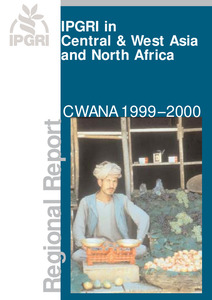IPGRI in Central & West Asia and North Africa: Regional report 1999-2000
The report highlights some particularly significant achievements of IPGRI's activities in Central & West Asia and North Africa in 1999-2000 and describes the impact that this work is having. The establishment of the CWANA regional office in 1992 allowed IPGRI to pay greater attention to the region in its global endeavour to promote the conservation and use of plant genetic resources. IPGRI currently has staff based in three countries in CWANA: Syria (Aleppo), Uzbekistan (Tashkent) and Tunisia (Tozeur). The main goal of IPGRI's work in CWANA is to help build up sustainable national plant genetic resources programmes. The Regional Team has contributed significantly to the implementation of IPGRI's strategy particularly through: the deployment of methodologies for the integrated conservation and use methodologies to priority crop gene pools of arid and semi-arid agro-ecosystems; strengthening international cooperation and networking; promoting conservation through use of underutilized and neglected species; raising public awareness and capacity building. Other milestones of IPGRI's work in this region include: the establishment of new national plant genetic resources (PGR) programmes and committees and new ex situ and in situ facilities; the provision of electronic-networking capacities in CWANA; the enhancement of the conservation and use of priority species such as pomegranate, olives, pistachio and almond; the introduction of an innovative and user-friendly information system for plant genetic resources; and the launch of major regional projects such as the recently initiated UNDP-GEF (United Nations Development Programme Global Environment Fund) project on date palm in the oases of the Maghreb. Past achievements of IPGRI in CWANA are detailed in IPGRI's pre-1999 series of Annual Reports.

